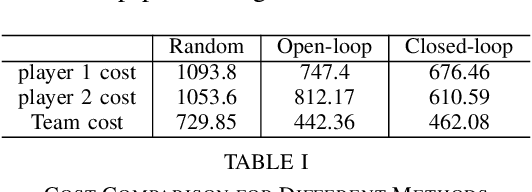Decentralized Role Assignment in Multi-Agent Teams via Empirical Game-Theoretic Analysis
Paper and Code
Sep 29, 2021


We propose a method, based on empirical game theory, for a robot operating as part of a team to choose its role within the team without explicitly communicating with team members, by leveraging its knowledge about the team structure. To do this, we formulate the role assignment problem as a dynamic game, and borrow tools from empirical game-theoretic analysis to analyze such games. Based on this game-theoretic formulation, we propose a distributed controller for each robot to dynamically decide on the best role to take. We demonstrate our method in simulations of a collaborative planar manipulation scenario in which each agent chooses from a set of feedback control policies at each instant. The agents can effectively collaborate without communication to manipulate the object while also avoiding collisions using our method.
 Add to Chrome
Add to Chrome Add to Firefox
Add to Firefox Add to Edge
Add to Edge